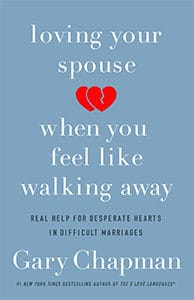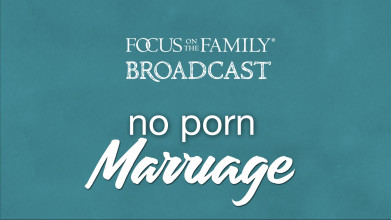Opening:
Excerpt:
Gary Chapman: I do believe that many, many people give up in those difficult marriages which, if they had a different perspective on things – which I’m calling reality living – they could be an influencer. It is true we can’t change our spouse. We can’t make them change. But we can influence them.
End of Excerpt
John Fuller: Insights from Dr. Gary Chapman, and he has more encouragement and hope for your marriage today, on Focus on the Family. Your host is Focus President and author Jim Daly, and I’m John Fuller.
Jim Daly: Last time, we talked with Dr. Chapman about some difficult situations within marriage – having a spouse who’s a workaholic or one who is depressed. We also touched on reframing your mindset to be more positive towards your spouse. I realize it’s a hard thing to do, but it’s necessary. And I love what Dr. Chapman said in that clip just a moment ago: “You can’t change your spouse, but you can influence them.” And with God’s help and guidance, you can have a thriving marriage. Today we have more help and trusted advice for desperate marriages. And I know you’ll want to hear what Dr. Chapman has to share.
John: He has been with us here a number of times on Focus on the Family. He’s always a favorite guest for Jim, for me, and also for our listeners – great responses every time he’s here. No doubt you’re familiar with his best-selling series, The Five Love Languages books. And our conversation today is based on another book that Gary wrote, called, Loving Your Spouse When You Feel Like Walking Away.
Body:
Jim: Gary, welcome back to Focus on the Family.
Gary: Thank you. Good to be back with you, Jim.
Jim: Man, we started the conversation last time, and it just went – so many good nuggets of wisdom that we discussed when it comes to the irresponsible spouse, the workaholic spouse. We’re gonna get into more of these things today. But Gary, we started with this concept of reality living. That’s not a retirement home…
(LAUGHTER)
Jim: …Title. Reality living, in your book, says what?
Gary: It says basically that we have to change our attitude and choose to see the positive in any situation. And there’s always something positive in the situation. So we change our attitude. The reason that’s so important is attitude leads to behavior. If I see something positive in the person, then it’s easier for me to give affirming words, for example.
Jim: Right.
Gary: So we change our attitude. And the other thing is that we recognize – and here’s a key reality – “I cannot change my spouse.” Everybody agrees to that.
Jim: They remind you every holiday season.
Gary: Absolutely. But here’s the rest of that story: I can influence my spouse. And we fail to recognize the power of influence. You know, in simple things – let’s say you come home after work, and you walk in the house, and you go give your spouse a hug and a kiss and ask how their day went. You just had a positive influence on them.
Jim: Yes.
Gary: On the other hand, you walk in at the end of the day, walk into the house. You don’t go greet your spouse. You go to the refrigerator, get you a drink, turn on the TV and sit down and unwind. You’ve just influenced them in a negative way.
Jim: “You don’t care about me.”
Gary: “You don’t care about me.” That principle applies in every marriage, in every situation. We do influence each other. What we need to learn is how to have a positive influence, and especially in these difficult marriages that we’re talking about today.
Jim: In that context, Gary, it just takes some thought and energy, right? I mean, you need to think about these things. Why do we not do that? What keeps us distracted from doing perhaps our number one job?
Gary: I think it’s because we just do what comes natural. And in our culture especially, what comes natural is to follow your emotions. So you feel hurt. The emotion of hurt leads you to lash out at them. And it makes things worse. You’ve had a negative impact on that relationship now. I think, Jim, another issue that I think is really important that often, in a very difficult marriage, the place to start – and this will be hard for people to hear – the place to start is by acknowledging my own failures in the marriage.
Jim: Yeah. That’s not easy to do.
Gary: See, because…
Jim: But it’s the right thing to do.
Gary: That’s right. Because, see, in our mind, the main problem is them. They’ve got the problem. They’re the alcoholic. They’re the workaholic. They’re the ones who won’t work. They’re the ones – and I understand that. And okay, so let’s say they’re 95 percent of the problem. But if you want to get things started off in a positive way and make a turn in your behavior, you apologize to them for your 5 percent. And you say, “Honey, I’ve been thinking about us a lot, and I realize that I’ve hurt you along the way, and I’ve failed to be a support to you in a lot of ways. And, in fact, I think I’ve come across as condemning to you in a lot of ways. And I deeply regret that. And I just want to ask you if you’ll forgive me from my behavior over the last 10 years.” Wow. They haven’t heard that before.
Jim: Yeah. And sometimes, Gary, I would think, depending upon how much scarring has occurred, if I could put it that way, you may not get the best response at that moment. You may, like you just expressed – like, “Wow. I’ve never heard that.” Or you may get, “Yeah, right. You know, I’ve heard that before.”
Gary: Absolutely. But they’re going to walk away, and they’re going to be thinking, “Wow.”
Jim: That’s different.
Gary: That’s different.
Jim: And that’s the key thing.
Gary: And so then, if you follow that up with really changed behavior on your part…
Jim: Right.
Gary: …It’s going to make a tremendous impact.
Jim: That’s amazing. Actions speak louder than words, right? Let’s move to some of the other conditions, you know, we talked about last time. But this idea of the controlling spouse – I doubt people want to be controlling. I mean, I think it is in our nature. But we don’t get married thinking, “I can’t wait to control that guy or that woman.” But it manifests. So I guess the question for me is twofold. What is happening there in the perpetrator, in the controller personality? What are they trying to achieve in that control? And then the second part of that question – how do they arrest it? How do they see it and begin to correct that?
Gary: Yeah. I think most people who have a controlling personality do not realize that they come across as a controller.
Jim: But you had a story in the book from – I think it was Philip and Gina – where Philip was driven and thought he was doing all the things you just expressed, you know, on behalf of the family. But Gina couldn’t take that controlling nature. What happened in their particular case?
Gary: You know, Philip had this idea that he wanted to retire when he was 50.
Jim: Okay.
Gary: He was a very driven guy. And he was – you know, he cut every corner to, you know, make sure he’s going to have enough money to retire.
Jim: So he’s putting all the acorns away?
Gary: Absolutely.
(LAUGHTER)
Gary: Yep. And, like, he told her that he was gonna – he put in these water saver shower heads.
Jim: Right.
Gary: “They’ll save us a bunch of money on water here,” you know. And she had – it took her 10 minutes longer to rinse the soap off of her body when she was taking a shower, you know. It just irritated her to death, you know?
(LAUGHTER)
Jim: Every day?
Gary: Every day, you know? And on that particular one, she said to him – she said, “You know, I know you think we’re saving money.” But she says, “I can’t take 10 minutes every day out of my schedule, you know, to just get the soap off my body.”
Jim: Right.
(LAUGHTER)
Gary: And if you don’t call the plumber and get that changed, I’m going to call the plumber myself. And I’m going to do it by Friday.
Jim: Wow. Okay.
Gary: He called the plumber. See, with a controller, there comes a place where you have to on individual issues say those kind of things. And, if they don’t, then you follow through because you have to break that model. But, eventually – because that alone did not change the situation – but, eventually, she left him a note one day, and she said, “I don’t know how you feel, but I’m just tired of being a child in our relationship.”
Jim: Wow.
Gary: And she said, “I’m going to move in with my mother.” And she left him the name of a counselor and a phone number. That rocked his world.
Jim: Oh, yeah.
Gary: It took him about a week, but he finally called the counselor. And when he did, he started the process of understanding his personality and how it was impacting her and their marriage. And the whole thing got turned around. And, eventually, after he had dealt with some of his issues as to why he was like he was, then the two of them got marriage counseling, and then they moved back together.
Jim: And they made it work?
Gary: And made it work.
Jim: Wow. That’s amazing. It’s so sad to hear that she was treated less as a child living with her mother than she was with her husband. Think of that.
Gary: Yeah.
Jim: What are some of those other do’s and don’ts in this category of the controlling spouse – the things not to say and the things to say?
Gary: Yeah.
Jim: I think what you’re saying there is so right – confront.
Gary: Yep.
Jim: But what are some of the negative things that we might say?
Gary: Well, it never helps to argue with a controller.
Jim: Huh.
Gary: That’s our natural bent, is we argue.
Jim: So ultimatums are the way to go?
Gary: Yeah. Ultimatums are far better than arguing. Arguing just goes downhill.
Jim: Okay.
Gary: It gets worse and worse and worse. And they don’t resolve because you can’t talk a controller out of their position because they know what they’re doing is good.
Jim: Right.
Gary: So arguing never helps. The submissive servant, long-term, doesn’t help. You see, sometimes a wife will just give in to a controlling husband, for example, and say, “Well, that’s just the way he is. So I’m just going to give in into this, and I’m just going to do whatever he says. And I’m just going to overlook this behavior.”
Jim: Because that brings peace…
Gary: Yeah.
Jim: …Or a type of peace?
Gary: Yeah. It brings a level of peace. But it’s a narrow peace. It’s not a deep peace.
Jim: Yeah.
Gary: And, ultimately, it never works.
Jim: Gary, as we transition now, we’re going to talk about physical abuse and also, um, issues of pornography and infidelity. This might be a good time to, uh, make sure small kids are away from the – the radio or the podcast, however you’re listening, whatever environment. But in that context, Gary, moving to physical abuse, I mean, here at Focus on the Family, we scream, “Get to a safe place if you’re in that situation.” We want to make sure the listeners know that. Don’t stay in a dangerous situation – you or your children. So get to safety, whether that’s a friend’s home, a family member’s home. And then get engaged with a counselor or someone who can begin to help you. But let’s go to the physically abusive spouse. What is happening in that relationship? Maybe walk us through the steps of the cycle of physical abuse.
Gary: Well, what happens is that within the abuser, tension begins to build over things they don’t like about their spouse. And they just hold it in for a while. And then eventually, it’s like an explosion. And they – that’s where the physical abuse comes in, where they slap or slam or kick or whatever. And then typically, there’s great remorse. They come back and say, “Oh, I’m so sorry, Honey.”
Jim: Well, we see that depicted in movies all the time…
Gary: Yeah, absolutely.
Jim: …Where that cycle is occurring.
Gary: And they seem so sincere. And they say, “It’ll never happen again.” But the cycle starts over.
Jim: Huh.
Gary: Two or three months, it may be good. And then, there’s another explosion.
Jim: Can I ask you – and this is to not draw sympathy for that abuser. I mean, that’s horrific. And no human being should abuse another human being. We all know that. What has happened to that human being where they become the abuser? And it’s not always men.
Gary: Yeah.
Jim: There’s a growing number of women that are the abuser. But what is happening there? When you look at their childhood and what went on, is there a pattern…
Gary: Yeah.
Jim: …That counselors see?
Gary: Often there’s anger that’s growing out of childhood abuse themselves. They were abused themselves.
Jim: So the abused become the abuser?
Gary: Yes. And because they never processed that anger and that hurt inside – because they couldn’t. If your parent is abusing you as a child, you can’t process it with the abuser. And so you…
Jim: So these are patterns?
Gary: That’s right. You hold it inside. But then you’re – begin following the same pattern they followed.
Jim: Ugh.
Gary: Because your hurt, your anger is inside. And that’s why the abuser needs help. You know, obviously, if they’re willing to go for counseling, they can get help for themselves.
Jim: Right.
Gary: If they’re – if they’re willing to do that. But I’m also asked the question, Jim, why – why do women stay in marriages like that?
Jim: Well, that’s the next one I was gonna ask.
Gary: Yeah.
Jim: And we say that around dinner when we know a relative or friend is in that spot.
Gary: Yeah.
Jim: We say, “Well, she just attracts those types of guys.”
Gary: Yeah.
Jim: What are we unwittingly saying when we say that?
Gary: Well, a part of that is there’s different reasons why women stay in abusive situations. One is that they have a personality themselves that’s what we call a rescuer mentality.
Jim: Uh-huh.
Gary: That they find significance in their own lives by helping people who are in trouble and helping them work through their problems.
Jim: Right.
Gary: And so they recognize that their spouse has a problem. And they – and they want to help the problem. And they – and so they have this mentality of – and they tend to end up marrying people who have these kind of personalities because, that – “I can help them.” Another…
Jim: Gary, before you move on.
Gary: Yeah.
Jim: Let me ask you this. I can hear the rescuer rationalizing, “That’s a wonderful Christian attribute, to want to help people.”
Gary: Yeah.
Jim: It sounds godly – and is godly. When does it become unhealthy?
Gary: I think the desire to help other people is certainly a godly desire. But when the person you’re trying to help is physically abusing you…
Jim: And you’re not leaving.
Gary: …And you’re not doing anything about it…
Jim: Right.
Gary: …Then you’re actually hurting them rather than helping them because you’re helping them establish a very negative behavior that’s never going to serve them in a positive way.
But I really want to scream a neon sign here. It’s not your fault that that person is abusing you.
Gary: Absolutely.
Jim: I mean, you may be enabling it in some way. But it’s not you. They’re choosing to do this.
Gary: Ab – Absolutely.
Jim: And you’ve got to get to a safe place. That’s our biggest point. I’m sorry. Now, you were going to go on.
Gary: Yeah, I was going to say another reason why some wives stay in abusive situations is they have isolated themselves from their family and their friends because they didn’t want to…
Jim: The embarrassment.
Gary: Yeah, they didn’t want their family to see them with a black eye or a bruise. And so they wait until they get healed before they even interact. And so they feel so isolated. They don’t have anywhere to go…
Jim: Yeah.
Gary: …Because no one else knows what’s going on. And then another is that they are actually fearful that if they do leave, the spouse will kill them.
Jim: And it can be that desperate.
Gary: And it could be – it could be that desperate for sure.
Jim: Man.
Gary: So that’s why some people stay in those kind of relationships. But that’s never the answer.
Jim: Gary, as we move to another very difficult topic in troubled marriages, and that is the unfaithful spouse, it’s an ever increasing problem in marriages today, the use of pornography, for example, and the damage it does. Let’s start there, with pornography, its prevalence in marriages today. What should Christian couples do who want to please the Lord? What should they do in this regard?
Gary: Well, you know, Jim, you’re exactly right that pornography has pervaded our society. And the whole technology world has made it so much easier now to have access to pornography. It’s always destructive to a marriage. I say to men especially, you know, “Guys, if you’re walking down that road, if you haven’t gone very far, can I urge you to turn around and burn the bridges and come back into the real world?”
Jim: Now, some men – and some women, now, too – addicted to pornography hear you say that, Gary, and they say, “I don’t know if I can.”
Gary: Yeah.
Jim: ‘Cause it is addictive behavior. So speak to that issue of addiction. And you may have maybe the light touch of it that a person can say, “Yes, I will choose a different path.” And they can do that starting right now.
Gary: Yeah.
Jim: Then others can’t. Describe the difference.
Gary: Yeah. And that’s why I say in the early stages. If you’re just beginning to go down that road, you can turn around. But if you’re already down to the end of that road and you’re addicted, you’ll have to have divine help. It’s just as addictive as cocaine. And what happens when you get to the end of that road, it’s idolatry.
Jim: Hm.
Gary: You have taken sex and made it God. You’ve taken a gift of God and made it God.
Jim: Right.
Gary: And you’re worshipping at an altar. So it’s idolatry. And so what I say to the guy who’s down at that end of that road is, “First of all, you’ve got to make the decision that it’s detrimental to your marriage. And it’s detrimental to you. And it’s obsessive with you. It’s become the center of your life. And that’s why I say you need divine help.”
Jim: Yeah.
Gary: “So go to somebody. Go to a pastor. Go to a counselor. Go to a trusted, older friend. Go to somebody and share…”
Jim: Start somewhere.
Gary: “…Where you are, you know. And let’s begin to take that journey back into the real world.”
Jim: Yeah. Gary, on behalf of – I just have that – that wife in my mind who has struggled with this. Maybe her husband is at that point where he’s addicted. And he’s justifying it by saying, “Well, it helps us in our physical relationship. It’s not a big deal. Trust me, this is a good thing.” Give her the ammunition, the ability to come back, spiritually speaking, biblically speaking, and say, “No, I don’t think so.”
Gary: Yeah. I think, Jim, this is where I feel some of the greatest pain, personal pain, when women sit in my office, when they’ve just discovered that their husband is into pornography. Here’s what they say, Jim: “What’s wrong with me?”
Jim: Yeah.
Gary: “Why does he have to go to a screen to see somebody he doesn’t even know? What’s wrong with me?”
Jim: Yeah.
Gary: And they weep.
Jim: It breaks their heart.
Gary: It breaks their heart. Because let’s face it, the sexual part of marriage is the most intimate part of marriage. I mean, the whole thing of becoming one flesh that…
Jim: Or knowing each other.
Gary: Knowing each other. Those biblical words, you know. And so I think – when I say to the lady, “You have to take a strong stand. And you have to say, ‘No, this is not acceptable. I cannot accept this. If you’re willing to go get some help now, then you begin to get some help. And we can talk about this. But I cannot accept this. And whatever the implications are if that’s the world you choose to live in, okay. You know, I don’t think that’s pleasing to God.’ And if he’s a Christian, you can talk as a Christian to each other about it because the whole biblical perspective is there. Jesus said, ‘You look on a woman, you committed adultery with her in your heart already.’ I mean, so, you know, you’re guilty of adultery is what it is. It’s non-physical adultery.” And so I think a wife has to take a loving but strong stand against that and not accept it as normal behavior.
Jim: Gary, let me make sure we clarify that because some counselors will take a position that there’s a distinction between the two, that pornography is not full-fledged adultery. It’s just a difference of opinion theologically, even, in that regard. Would you agree that those two statements are out there, that there is a distinction?
Gary: Yeah, and I think there is a distinction between that. There is mental adultery.
Jim: Okay.
Gary: That’s what Jesus said.
Jim: And that’s what He’s talking about.
Gary: That’s what He’s talking about. Mental adultery. And there’s physical adultery. And, yes, they’re not the same. They’re not to be equated, but they’re both adultery, according to Jesus. So I think that, you know, the mental adultery involves you and somebody, some picture or some person that you’re looking at.
Jim: Right.
Gary: Physical adultery involves two people.
Jim: Right.
Gary: And a lot of other people get hurt in the process with that.
Jim: Yeah.
Gary: And I think it is a deeper hurt in a marriage when your spouse is sexually involved with somebody else.
Jim: It’s the ultimate unfaithful.
Gary: Absolutely. Yeah, it is a deeper hurt.
Jim: Yeah.
Gary: No question about it.
Jim: Let’s move to that because that’s also a topic in your book. And this is where we’ll end. And again, what I want people to hear if you need help in any of these difficult areas that we’ve talked about today, we’re here for you at Focus on the Family. That’s our mission. We want you to thrive in Christ. And we don’t want you to languish in a marriage that is just unhealthy. So at least take that first step and call us. Gary, that unfaithful spouse situation, there’s two paths in front of that faithful spouse – either divorce, which scripture clearly says is an option. Then there’s repairing the marriage, probably aligning with the heart of God to say He hates divorce in every case. But that’s a difficult journey. Describe those two decisions.
Gary: It is a difficult journey. I do believe that there is life after infidelity, but it requires the person who’s been involved in the infidelity choosing, with the help of God, they’re going to break off that relationship. It’s going to be history. No contact. And then they’re going to get help themselves. They’re going to get counseling themselves and deal with what is it about them that led them to where they were willing to get involved in a relationship outside the marriage. So they need help. It also is going to require real forgiveness on the part of the spouse.
Jim: Yeah, most profound.
Gary: Yeah, and the other thing I like to really make clear here is that even if your spouse does break off the relationship, even if they do get counseling, even if they do come back and the two of you begin to get counseling and you choose to forgive them, which is the biblical response…
Jim: Yeah.
Gary: …Where God forgave us no matter what we’ve done. He forgives us. And we’re to forgive as Christ forgave. But forgiveness does not rebuild trust.
Jim: That’s a process.
Gary: Forgiveness opens the door to the possibility that trust can be reborn.
Jim: Yeah.
Gary: And as you say, it’s a process.
Jim: That’s well said.
Gary: So I say to the husband who, if he’s been unfaithful, “If you want her to trust you again, here’s your response. You say to her, ‘My cell phone is yours, honey, anytime you want to look at it. My computer is yours. If I tell you I’m going over to George’s house to work on his car, if you want to come by and see if I’m there, it’s fine, honey.’“
Jim: Or call George.
Gary: Yeah, or call George. “‘I’ve deceived you enough. I’m through with deceit. I’ve hurt you enough.’ And you take that approach. She’ll trust you again three months, six months, nine months down the road. She’ll trust you again.”
Jim: So that’s a good thing to do. What are some other do’s and don’ts in that very harmful, hurtful situation?
Gary: I think one thing is often if the relationship has gone on for a while and you break it off, that person’s going to call you again two or three times trying to pick the relationship back up.
Jim: Yeah.
Gary: You can’t keep them from calling you, but you don’t get involved in a conversation with them. You make it as brief as you can. Then you tell your spouse, “They called me today. Here was the conversation that went on.”
Jim: Gary, when you look at this – I mean, the Lord knows us. He knows all of us. He knows the thought lives that we have. It’s an open book for Him. Why does He put up with it, I guess? How does He put up with it? What is God trying to do through all of this in our own hearts? I mean, I’m talking about that really painful situation of unfaithfulness. What does the Lord want to achieve in both people?
Gary: Yeah. Well, let’s face it, we’re all broken in one way or another. And some of our brokenness hurts other people more than other things do. And this – in the marriage – this is the deepest hurt I think we can have is for our spouse to be sexually involved with someone else. And that is why it takes time for there to be healing in this kind of relationship. Well, I think what God wants to do is always redemption. God is in the business of redeeming people, taking people where they are with all of their failures, first of all, forgiving them when they repent. Forgiveness is always based on repentance. God doesn’t forgive everybody. He forgives people who apologize, who confess their sin and turn from their sin.
Jim: Mmhmm.
Gary: He forgives them. And so that is the message of the gospel. No matter who you are or what you’ve done, you can be forgiven. Then you turn your life over to Him to let Him remake your life, and as we said early – earlier on in the program, to make you like Christ.
Jim: Yes.
Gary: And as you become more and more like Christ and your spouse becomes more and more like Christ, you discover the marriage you always wanted – a loving, supportive, caring relationship.
Jim: What a great place to end. Gary, that’s the goal. Thank you so much for being with us here at Focus. Thank you.
Gary: Well, thank you, Jim. I always enjoy chatting with you.
Closing:
Jim: And Gary, I have a few more questions that I want to ask you regarding sexual abuse within marriage, healing childhood traumas, and abusive relationships that exist. We’ll take that portion of the conversation to our website. So, turning to you, the listener, join us online to hear that part of our discussion.
And maybe today has made you realize that you have a problem in your marriage that needs to be resolved and you’re ready to start. We have caring, Christian counselors on staff here at Focus that will provide you with that initial consultation and then be able to refer to someone in your area to carry the conversation forward.
And for couples who are further down the road towards separation or divorce, we also have our Hope Restored marriage intensives. I am so excited about how God is working through these intensives to make marriages stronger than ever before. The stories we hear from the couples that go through the program are really inspiring. One of the participants recently told us: “When we arrived, we had been separated for two and a half months. We had been to four different marriage counselors on and off over 15 years. My husband said he would give Hope Restored a 100 percent effort, but he had low hope that if God didn’t do something big, it would be time for formal separation. I am thrilled to say that we both have hope, and now, have some great tools to start operating in a safe place with each other.” John, I love that. This couple, like so many others, now have hope in their marriage, and that’s what it’s all about.
John: Yeah, that program has done so much for so many couples who seemed like they were out of gas totally.
Jim: Yeah, in so many cases, they’ve already signed divorce papers, so I don’t think you’re going to present something that we haven’t seen.
John: Yeah, so make a call today. Talk to one of our counselors. Maybe learn more about Hope Restored. Our number is 800, the letter A, and the word FAMILY.
Jim: And I hope you’ll join us in this ministry to couples, which will help strengthen families across the globe. Your ongoing monthly support of Focus on the Family allows us to continue providing couples with this hope in Christ through broadcasts like this one, other articles and resources, our counseling efforts, and Hope Restored. Partner with us to help marriages thrive. In this culture today, we need marriages to thrive. In fact, we’ll send you a copy of Dr. Chapman’s book, Loving Your Spouse When You Feel Like Walking Away, as our way of saying thank you for standing in the gap with your monthly commitment. And if you can’t afford that, we’ll send it for a one-time gift as well.
John: Yeah, become part of our support team and get your copy of Dr. Chapman’s book and a CD or download of this really great two-day conversation we’ve had with him. Our number is 800-A-FAMILY or online – focusonthefamily.com/broadcast.
By the way, when you’re at our website, be sure to check out the extra portion of this conversation that we had with Dr. Chapman.
On behalf of Jim Daly and the entire team, thanks for listening to Focus on the Family. I’m John Fuller inviting you back as we once again help you and your family thrive in Christ.























